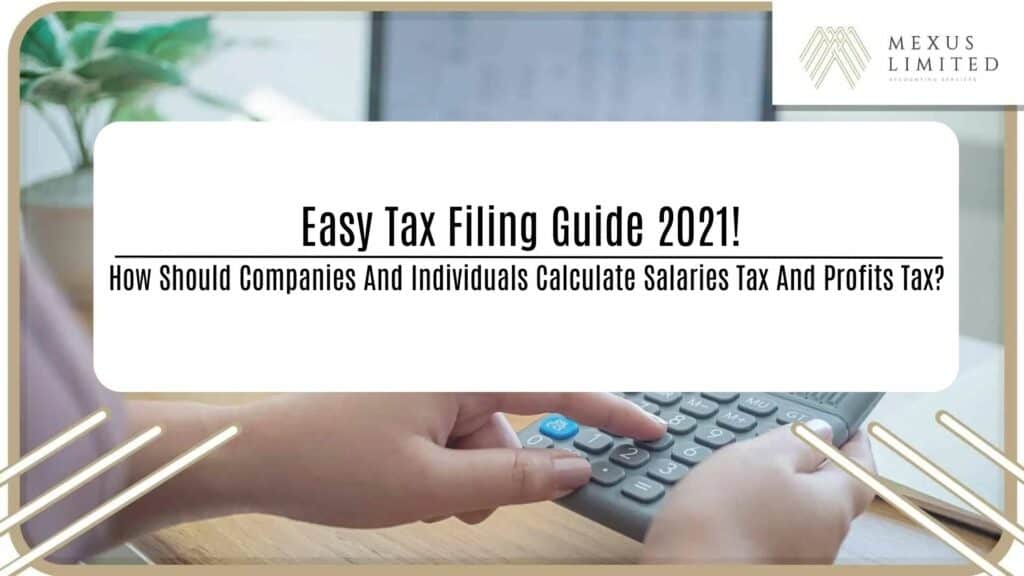Easy Tax Filing Guide 2021! How should companies and individuals calculate salaries tax and profits tax?

Every April is tax season. If there are many question marks about tax returns, many questions remain unanswered, such as how much tax should an employer and an employee pay, etc.? This article will try to go from simple to deep to help you who are confused by tax bills.
Read this article to learn more about tax declaration in Hong Kong, but due to the limited space, this article will focus on salaries tax and profits tax first, and then describe the property tax content.
Introduction to Hong Kong Tax System
First of all, whether you are starting a business or working as an employee in Hong Kong, you should understand the Hong Kong tax system.
Hong Kong’s income tax is one of the most favourable tax systems in the world and enjoys an international reputation. The classification tax system also divides the main taxes into three categories: salaries tax, profits tax and property tax.
In a nutshell, when filing tax returns, employees pay salaries tax, business owners pay profits tax, and those who make income from real estate properties pay property tax.
In addition, the Hong Kong government will not levy taxes on inheritance tax, value-added tax, business tax, sales tax, capital gains tax, etc. that are often heard.
salaries tax
Let’s start with the salaries tax. According to Hong Kong’s “Inland Revenue Ordinance”, if you hold an office due to employment in Hong Kong, or the income generated from Hong Kong, or even receive a pension, you must pay salaries tax in the year of assessment based on your actual income.
If you are not working as an employee, you will be considered self-employed and will be subject to profits tax on your income.
How to calculate salaries tax?
For the year of assessment 2019/20, salaries tax is charged at the lower of:
1.) Multiply the “Actual Taxable Income” by the “Progressive Tax Rate”
2.) “Net Income” multiplied by “Standard Tax Rate”
“Taxable income” = total income – total deductions – total allowances
“Net Income” = Gross Income – Total Deductions
When filing tax returns in Hong Kong, the “standard rate” of salaries tax is 15%, while the “progressive rate” is as follows:
$0 – $40,000 HKD: 2%
$40,001 – $80,000 HKD: 7%
$80,001 – $120,000 HKD: 12%
Above $120,001 HKD: 17%
In other words, for the 2019/20 year, if the annual income is higher than HK$132,000, the allowance should be exceeded and tax returns must be filed with the Inland Revenue Department.
profits tax
In short, the “Inland Revenue Ordinance” stipulates that any business activities in Hong Kong include trades, professions or businesses, whether the object is a corporation, partnership, trustee or body, as long as it is a profit generated or derived in Hong Kong. (net income after deduction of expenses), all need to report to the government and pay profits tax.
In addition, regardless of whether the taxable object resides in Hong Kong or not, as long as the above conditions are met according to the facts, even overseas persons are also subject to taxation.
In addition, if the profit-making business involves buying and selling buildings or properties, the object will be deemed to be operating a business and will be subject to profits tax on the profits.
How to calculate profits tax?
Under the two-tiered profits tax system, for the year of assessment 2019/20, if an enterprise earns the first two million HKD profits, it will be subject to profits tax of 8.25%, and the subsequent profits will be subject to profits tax at the rate of 16.5%.
In contrast, if it is a sole proprietorship or partnership unincorporated business, the first two million profit tax rate will be half of the standard tax rate – 7.5%, if the profit exceeds two million, the tax rate will be 15%.
Similar to salaries tax, businesses can reduce the tax they pay through various tax deductions and exemptions.
The above information is for reference only. If in doubt, we welcome your tax enquiries.


